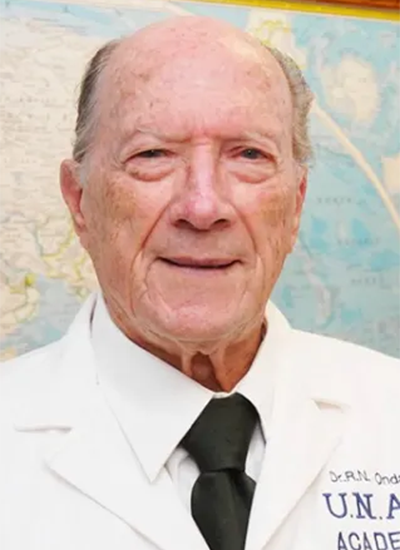In memoriam: Raul Ondarza–Vidaurreta
Raul Ondarza–Vidaurreta, the first biochemistry instructor on the medical faculty at the Universidad Nacional Autónoma de México and a member of the American Society for Biochemistry and Molecular Biology since 1974, died Feb. 7. He was 93.

Born Oct. 29, 1928, in Tampico, Tamaulipas, Mexico, Ondarza–Vidaurreta earned his doctorate at the UNAM and completed postdoctoral fellowships at the University of Glasgow and New York University. In 1958, he joined the UNAM faculty, and he was appointed chair of molecular biology in 1963. He founded and taught an optional class in epigenetics.
Ondarza–Vidaurreta also served as a medical sciences researcher at Mexico’s Instituto Nacional de Salud Publica, where he focused on drug targets for infectious diseases and human parasites, including cancer cells infected with the Papilloma virus. At various times, he was a professor at the Scripps Institution of Oceanography, a visiting researcher in the chemistry department at the University of California, San Diego, and a fellow of the John Simon Guggenheim Memorial Foundation.
He was an advisor to and general coordinator of science committees of Mexico’s Consejo Nacional de Ciencia y Tecnología from 1971 to 1982, during which time he worked to create five new research centers dedicated to ecology, biomedical research, biotechnology, chemistry, and marine biology and oceanography. He was general director of an ecological research center from 1983 to 1989 and director of the INSP’s infectious diseases research center from 1990 to 1993.
Ondarza–Vidaurreta wrote more than 15 books, including biology texts, and numerous chapters and articles. Among his many honors, he received the Academia Nacional de Medicina de México’s Carnot Award and an honorary doctorate from the University of Paris XIII. In addition to the ASBMB, he was a member of National Academy of Medicine of Mexico, the Biochemical Society of Great Britain, the Mexican National Legion of Honor and the International Society for the Study of the Origin of Life. He was a founder of the Mexican Academy of Sciences and the Mexican Association of Human Genetics.
Enjoy reading ASBMB Today?
Become a member to receive the print edition four times a year and the digital edition monthly.
Learn moreGet the latest from ASBMB Today
Enter your email address, and we’ll send you a weekly email with recent articles, interviews and more.
Latest in People
People highlights or most popular articles

2026 ASBMB election results
Meet the new Council members and Nominating Committee member.

Simcox wins SACNAS mentorship award
She was recognized for her sustained excellence in mentorship and was honored at SACNAS’ 2025 National Conference.

From humble beginnings to unlocking lysosomal secrets
Monther Abu–Remaileh will receive the ASBMB’s 2026 Walter A. Shaw Young Investigator Award in Lipid Research at the ASBMB Annual Meeting, March 7-10 in Washington, D.C.

Chemistry meets biology to thwart parasites
Margaret Phillips will receive the Alice and C. C. Wang Award in Molecular Parasitology at the ASBMB Annual Meeting, March 7-10 in Washington, D.C.

ASBMB announces 2026 JBC/Tabor awardees
The seven awardees are first authors of outstanding papers published in 2025 in the Journal of Biological Chemistry.

Decoding how bacteria flip host’s molecular switches
Kim Orth will receive the Earl and Thressa Stadtman Distinguished Scientists Award at the ASBMB Annual Meeting, March 7–10, just outside of Washington, D.C.
